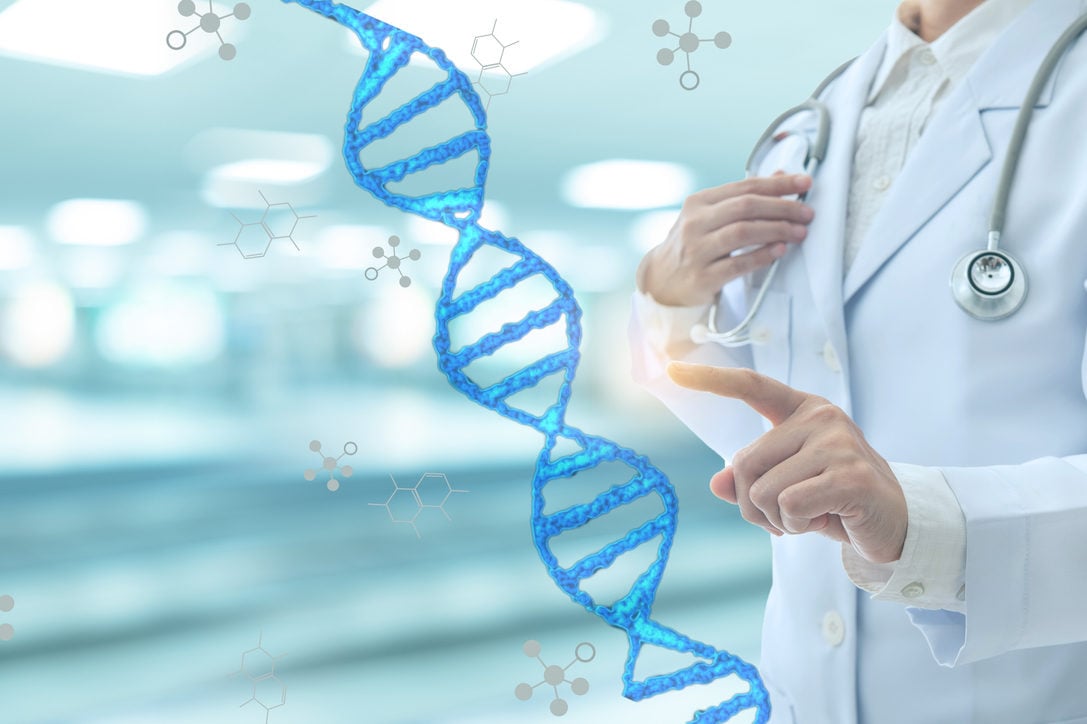Table of Contents
What comes to your mind when you think of genetic testing? Probably some difficult examination, state-of-the-art technology, and the need to visit a specialized laboratory. As science, medicine and technology evolve rapidly, there is also great progress in the field of genetic testing. As a result, you can very easily test your own DNA and receive important information that may be related to your health, nutrition and overall lifestyle. In the article, we explain what DNA is, how domestic genetic testing works, and how the information you get from it can be used to your advantage. You will also find out if it can make your journey to your dream body or better health any easier.
What is DNA and genetic testing?
You don’t have to be a genetic engineer to understand the basics of DNA. This is the “code” of life that almost every living cell contains. Genetic tests can look at DNA very closely and at the same time they can reveal very important information not only for health, but also for the lifestyle of an individual.
DNA is the biological program within our cells
Just as computers are composed of individual parts, so are our bodies made up of cells. These individual parts or cells contain information that is used for their proper function. It’s the kind of program a cell follows. And it is this “program” in our body that we call DNA. You can imagine it as a kind of twisted spiral that has rungs similar to those on a ladder.
DNA is composed of several smaller chains that are arranged into chromosomes. We have a total of 23 pairs, half of which come from the father and the other half from the mother. One of these pairs determines the sex of an individual, and you may already know that chromosome XX is typical for women and XY for men. The complete set of chromosomes is called a genome, and all the genetic makeup of an individual is called a genotype. [1–3]

By receiving genetic makeup from our parents, it’s obvious that we inherit hair colour, eye colour, or even blood type. Did you also know that:
- if you stretch out the DNA spiral, its length is roughly equal to the distance between the Earth and the Sun back and forth, about 600 times,
- all your acquaintances, friends and colleagues have DNA that is 99.9% identical to yours,
- and chimpanzee DNA is 98.7% identical to human DNA
- and the banana you just ate has 41% identical DNA to you. [4–5]
Genetics can affect almost every aspect of life
Genes provide a certain prerequisite for how you look, what sport you might be successful at, or what your ideal job will be. It doesn’t mean you’re born, and only because of your genes that you will end up, say, an obese, unsportsmanlike office worker or a perfectly muscular top manager. This is just a certain “draft”, but you can work with it and change it more to your liking. The environment in which you live and your overall lifestyle also have a huge impact on your appearance, position in society or physical condition. As a matter of interest, the influence of environment and lifestyle on the functioning of genes is researched under a scientific field called epigenetics. [8-9]
Not only does genetics play a big role in how big your nose is, but it can also affect how your body “tolerates” or metabolises certain substances such as caffeine, alcohol or medication. You may know someone who drinks six cups of coffee a day and still sleeps “like a baby” at night, and you have a weaker cappuccino after lunch, and counting sheep will not help you sleep.
A lot of other mysteries can be explained by small variations at the gene level, such as why some individuals perceive the taste of coriander as “soapy”, or why your friend turns red after the first glass of wine. [10–11]

Genetic tests may detect a genetic mutation
Perfection doesn’t exist, even at DNA level. It may contain errors that are congenital or acquired during life due to the environment (e.g. smoking, UV radiation). Just a small deviation, a change in the “program” of the cell, and everything in a person’s life can be completely different. Known genetic diseases include Cystic Fibrosis or Down Syndrome.
Genetic tests can reveal changes at the DNA level. They examine the chromosomes, genes and proteins from which DNA is formed. Thanks to this, they can find out if a particular individual has already appeared or is at risk of some genetic mutation that is behind the development of the disease.
Where appropriate, information on an impending or ongoing genetic defect may facilitate the process of finding an appropriate treatment.
These tests work by examining one or more DNA sequences that may be responsible for the development of a disease or, according to their arrangement, can be assumed, for example, food intolerance. Some genetic tests can even test your entire genetic makeup, or genotype. [6–7]
You might be interested in these products:
Home genetic tests are experiencing a massive “boom”
Personalized nutrition and training based on genetic tests give a whole new dimension to the “tailor-made” plan. Man is by nature an inquisitive creature and so it is clear that they do not want to miss the opportunity to learn as much as possible about their origins, innate talent for various sports, but also something about the level of risk of certain diseases. Thanks to home genetic testing this has never been easier. These tests are not for diagnosis or treatment of diseases, but they provide information to users, and it is up to them how they deal with this information. [12]
What can you learn from home genetic testing?
Home genetic testing will provide you with valuable information and specific recommendations to optimize your life in many ways. You may learn that you have hereditary preconditions for developing a disease, and this will make you put more emphasis on prevention. Based on your DNA analysis, you will receive specific recommendations that you can apply to your life. [13-14]
What areas of life can genetic tests help you improve?
- Suitable diet – results of genetic tests with a focus on diet can help you with specific recommendations for changes in diet routine. Based on an analysis of how your body responds to your DNA nutrient intake, you may receive recommendations for the amount and ratio of carbohydrates, proteins and fats in your diet. This genetic test often focuses on a more detailed analysis of the ADIPOQ gene, some variations of which are associated with the risk of obesity and thus may affect your success in losing weight.

- Sport selection – have you tried countless different kinds of sports and still don’t know which one is best for you? A home genetic test can direct you to types of sporting activities that are consistent with your genetic makeup. DNA plays a big part in what your predetermined skills are in endurance, strength sports or even flexibility. For example, analysis of the COL5A1 gene evaluates how prone you are to muscle spasms caused by exercise.
- Intake of vitamins and minerals – the genetic makeup of an individual also influences the metabolism of these micronutrients. Based on analysis, you may be provided recommendations on the amount of important vitamins and minerals you should optimally take.
- Metabolism of nutrients and other substances – some genes are responsible for how you digest, say, gluten or lactose, and by investigating these you may discover food intolerances, and depending on the results you can adjust your diet. There are also tests to assess the risks of alcohol or other drug addiction. As a matter of interest, analysis of the DQA1 and DQB1 genes determines the risk of increased gluten susceptibility.
- Health condition – certain diseases and health disorders are associated with a specific genetic mutation. These are, for example, certain types of cancer, Alzheimer’s disease, Parkinson’s disease, coeliac or heart disease. For example, the discovery of the BRCA1 gene poses an increased risk for breast cancer.
- Origin – some companies offer the possibility of testing your origin. This gives you information about, for example, the geographical area in which your ancestors lived and details of your ethnic origin. You can easily create your own family tree with this information.
- Psyche and sleep – some tests can even reveal how sensitive you are to stress and help you set your optimal sleep regimen. For example, it evaluates a variant of the COMP gene that affects how well you handle stress.
- Skin care – genes affect the condition of the skin and how we age. By analysing your genes, you will find out what changes in your diet or skin care you can make to keep your skin as youthful as possible. People with variations in the MMP1 gene are more prone to faster loss of skin elasticity.
- Paternity test – home tests also offer the possibility of finding out if a man is the biological father of a child. [15]
For interest’s sake, you can also find tests on the market that tell you information about how you perceive the taste and smell of foods and beverages. DNA also has built in information as to whether you will like sweets, broccoli or what type of wine is most pleasing to your taste buds. [16-18]

How are home genetic tests used and how do they work?
When you order this test at home, you will receive instructions and all the necessary tools to take a sample. Usually, a sample is taken from the inside of the cheek or saliva. This sample is then sent to the laboratory as instructed or picked up by a courier who will take it to the collection point. This depends on the company from which you purchased the test. Then you wait for the results that will come by mail, email or app on your smartphone. Some companies offer consultations with their specialists to explain the results in more detail to help you apply any recommended changes. [19]
Can genetic tests make it easier for you to find your path to your dream body?
Evidence that some known diseases, such as diabetes, heart and blood vessel disease or bone thinning, are partly influenced by genes that already exist and are very convincing. It also appears that some genetic variations may affect the metabolism of certain nutrients. This means that there may be variations in nutrient intake needs between individuals. For example, hereditary haemochromatosis causes excessive storage of iron in the body and therefore its increased intake is highly toxic for individuals with this metabolic disorder. [20]
If you are still looking for something in the world of nutrition and have already tried every direction and diet that exists, and you still can’t figure out which is “right” for you, genetic testing can help you in this regard. Based on an evaluation of your genetic predisposition for metabolizing nutrients such as proteins, carbohydrates and fats, you can develop a personalized nutrition plan tailored to your genes.

Nutrigenomics is dedicated to personalised nutrition
Nutrigenomics specializes in the association between genes, nutrition and health. It aims to explain how the human body responds to food or drink intake and how to use this information to optimize health. Some may be comfortable with the standard approach, which includes general recommendations, but there are also individuals for whom a tailor-made plan can significantly improve cooperation, motivation and thus overall outcomes. [21]

Recommendations based on nutrigenomics may be more closely adhered to
For most people, a general recommendation for a healthy diet is sufficient. However, a diet adjustment based on these change suggestions may not suit everyone, and not everyone will achieve the desired results. As mentioned above, genetics plays a role in how your body metabolizes certain nutrients. This may explain why someone can “afford” to have more fat in their diet while maintaining healthy cholesterol levels and other indicators that determine the risk of developing cardiovascular disease. Large differences may be needed in an appropriate nutrient ratio. For you, it is ideal to have 60% carbohydrates in your diet, while your friend is better at 40% carbohydrates. [22]
If you want to learn more about a healthy diet, read the article What Is A Healthy Diet and How To Learn To Eat Healthily?
You probably know that obesity or being overweight is often related not only to lifestyle, but also to genetic makeup. There is some genetic variation (rs1558902) that is associated with the risk of developing obesity. And it was those with this gene who were invited into the study, which ran for 2 years. Participants were weighed at the outset, a thorough physical examination was carried out and a diet plan was recommended. They were divided into four groups, each given a different diet with different nutrient ratios. One interesting result of the study was that participants with a variation of the rs1558902 gene had better results (higher reductions in weight and fat) on a high protein diet than other test subjects who did not have this variation. This could be one indication that genes can affect how our bodies respond to changes in diet. [23]
Another study looked at whether specific proposals for dietary changes resulting from genetic testing had a greater impact on people’s adherence to them than normal general recommendations. As a result, it was found that the group of participants who received a personalized recommendation based on a genetic test were more motivated and made larger changes compared to the group without genetic testing undertaken. Similar results were obtained in a study according to which the recommended dietary changes to lose weight were better followed in the long term in people who received a plan developed with the help of nutrigenomics. [24-25]

What can genes affect in our diet?
- appetite for food
- suitable energy intake
- ideal amount of macronutrient intake – proteins, fats and carbohydrates
- metabolism and fat storage
- metabolism of vitamins and minerals
- composition of the microbiome – beneficial microorganisms living in our large intestine [26]
Are there any risks with home genetic testing?
Domestic genetic testing is most often taken from the saliva or the inside of the cheek, so the risks of damage to physical health are minimal. But it is important to remember that you should not take their results as the “holy grail” and consider them as the only truth. These tests are still evolving and may not take into account your lifestyle and the environment in which you live. These are factors that we already know have an undeniable effect on your life. Think of genetic test results more as another piece of the puzzle or as information to help you make better and more informed choices that can have a big impact on your quality of life in the long run. [27]
What should you remember?
Genetics has a huge impact on human health. It even affects how you look, which sport is perfect for you, or how your body tolerates caffeine. Based on home genetic tests, valuable information can be obtained that can help you optimize your lifestyle and make your journey for reaching your goals easier. According to some studies, people who have received recommendations based on genetic tests are more motivated to follow them and improve their lives. A personalized diet and training plan can thus be an ideal solution for those who have not had results with common methods until now.
Have you ever heard of home genetic testing or a personalized diet based on DNA? Share your opinion with us, and if you liked the article, share it with your friends.
[1] QGEN.Co je součástí genetiky. – https://www.qgen.cz/co-je-dna-a-genetika
[2] Healthline. What Is DNA? Structure, Function, Pictures & Facts. – https://www.healthline.com/health/what-is-dna
[3] Science. DNA, explained. – https://www.nationalgeographic.com/science/article/dna-deoxyribonucleic-acid
[4] Ancestry Blog. 6 Weird But True Facts About DNA. – https://blogs.ancestry.com/cm/weird-but-true-facts-about-dna/
[5] Helmenstine, A. DNA Facts—Fun Facts About DNA. – https://sciencenotes.org/20-dna-facts-fun-facts-about-dna/
[6] MedlinePlus Genetics. What do the results of direct-to-consumer genetic testing mean?– https://medlineplus.gov/genetics/understanding/dtcgenetictesting/dtcresults/
[7] Genetic Testing FAQ. Genome.Gov. – https://www.genome.gov/FAQ/Genetic-Testing
[8] CDC. What is Epigenetics? – https://www.cdc.gov/genomics/disease/epigenetics.htm
[9] Conn, C. A., Vaughan, R. A., & Garver, W. S. (2013). Nutritional Genetics and Energy Metabolism in Human Obesity ]https://doi.org/10.1007/s13668-013-0046-2]
[10] Coffee Doesn’t Give You the Jitters, Alcohol Makes You Blush: Thank Your Genes | Breakthroughs. – https://www.breakthroughs.com/foundations-science/coffee-doesn%E2%80%99t-give-you-jitters-alcohol-makes-you-blush-thank-your-genes
[11] Science. Do you love or loathe coffee? Your genes may be to blame. – https://www.nationalgeographic.com/science/article/news-daylight-saving-time-coffee-caffeine-genes-dna
[12] Michigan Medicine. At-Home Genetic – https://www.uofmhealth.org/health-library/abr9110
[13] MedlinePlus Genetics. What kinds of direct-to-consumer genetic tests are available – https://medlineplus.gov/genetics/understanding/dtcgenetictesting/dtctesttypes/
[14] CDC. Genetic Testing. – https://www.cdc.gov/genomics/gtesting/genetic_testing.htm
[15] GenePlanet. – https://geneplanet.com/eu
[16] The Role of Genetics in Food Taste and Smells – https://www.eatright.org/food/nutrition/healthy-eating/the-role-of-genetics-in-food-taste-and-smells
[17] MedlinePlus Genetics. What kinds of direct-to-consumer genetic tests are available?– https://medlineplus.gov/genetics/understanding/dtcgenetictesting/dtctesttypes/
[18] Harvard Health. Should you get a home genetic test? – https://www.health.harvard.edu/staying-healthy/should-you-get-a-home-genetic-test
[19] Michigan Medicine. At-Home Genetic .– https://www.uofmhealth.org/health-library/abr9110
[20] STOVER, P. J., & CAUDILL, M. A. Genetic and Epigenetic Contributions to Human Nutrition and Health: Managing Genome–Diet Interactions. – https://doi.org/10.1016/j.jada.2008.06.430
[21] Clevel, K. K. K. is the lead dietitian at, Wellness, C., Clevel, P. M. in, author, O. S. is a best-selling, & Dietitian, A. A. W. (b.r.). Do DNA-based diets work? – https://www.today.com/health/do-personalized-diets-work-t183387
[22] Protein, Carbs, and Fat: How DNA Affects Macros in Your Diet – https://www.issaonline.com/blog/index.cfm/2020/protein-carbs-and-fat-how-dna-affects-macros-in-your-diet
[23] Zhang, X., Qi, Q., Zhang, C., Smith, S. R., Hu, F. B., Sacks, F. M., Bray, G. A., & Qi, L. FTO genotype and 2-year change in body composition and fat distribution in response to weight-loss diets: The POUNDS LOST Trial. – https://doi.org/10.2337/db11-1799
[24] Nielsen, D. E., & El-Sohemy, A. Disclosure of Genetic Information and Change in Dietary Intake: A Randomized Controlled Trial. – https://doi.org/10.1371/journal.pone.0112665
[25] Horne, J., Gilliland, J., O’Connor, C., Seabrook, J., & Madill, J. Enhanced long-term dietary change and adherence in a nutrigenomics-guided lifestyle intervention compared to a population-based (GLB/DPP) lifestyle intervention for weight management: Results from the NOW randomised controlled trial.– https://doi.org/10.1136/bmjnph-2020-000073
[26] The Future of Nutrigenomics—Today’s Dietitian Magazine. – https://www.todaysdietitian.com/newarchives/1017p30.shtml
[27] Genetic testing—Mayo Clinic. – https://www.mayoclinic.org/tests-procedures/genetic-testing/about/pac-20384827


Add a comment